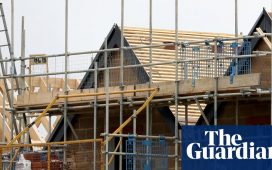Stay informed with free updates
Simply sign up to the UK property myFT Digest — delivered directly to your inbox.
New curbs on short-term property rentals in England will be unveiled by the UK government on Monday, despite warnings from estate agents and tourism chiefs that the move could dent local economies.
Michael Gove, Levelling Up secretary, will announce plans to force second-home owners to seek planning permission for short-term lets in future, alongside the creation of a mandatory national register of short-term rental properties.
“We know short-term lets can be helpful for the tourist economy, but we are now giving councils the tools to bring them under control so that local people can rent those homes as well,” he said.
The move follows long-standing concerns about local residents being pushed out of tourist hotspots on account of fierce competition with holidaymakers for accommodation.
However, property agents and tourism groups criticised the proposals when they were first floated by ministers last April, arguing they would do nothing to bolster the supply of housing while risking damage to local businesses.
The plans sparked debate within the Conservative party, receiving guarded praise from some Tory MPs, while being branded “anti-business” by former Tory housing secretary Simon Clarke.
Under the proposed reforms, set to be introduced this summer, property owners will still be able to rent their main or sole home for up to 90 nights a year.
The Department for Levelling Up, Housing and Communities said the changes were part of a wider plan to prevent the “hollowing out” of communities and ensure local people can continue to live in the area they consider their home, as well as crack down on antisocial behaviour linked to the high density of short-term lets.
Lucian Cook, head of UK residential research at estate agent Savills, conceded the short-term rental market had taken much needed housing stock out of the private rental sector.
“On that basis, local authorities will welcome the requirement for planning consent in the future, though this could place a short-term burden on already constrained resources,” he said.
He added that in the longer term, the reforms could create a “two-tier market” between properties with and without planning consent for short-term lets, and stressed that more housebuilding was crucial to ensuring affordable supply for local residents.
Amanda Cupples, northern Europe general manager at Airbnb, welcomed the creation of the national short-term lets register. “Families who host on Airbnb will benefit from clear rules that support their activity, and local authorities will get access to the information they need to assess and manage housing impacts and keep communities healthy, where necessary,” she said.
Existing dedicated short-term lets will not require a planning application. The changes will not affect hotels, hostels or B&Bs.
Shadow housing minister Matthew Pennycook told the Financial Times last December that Labour also wanted to hand local communities new powers to combat “excessive concentrations” of second homes or holiday lets to boost the economy in those areas.










